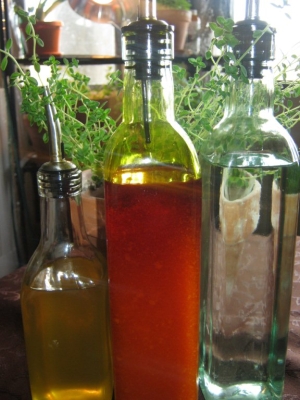Natural Year Challenge: Food - Month Three
Use Healthy Oils and Fats
Welcome to the third step in our Natural Year Challenge! This month we'll continue our transition to a healthy, natural, and flavorful diet with a careful look at some important building blocks in the foods we consume: oils and fats.
With all the conflicting information regarding fats and oils, how do we choose confidently? What is the truth about animal fat, canola oil, saturated fats, and coconut oil?
Let's first consider the difference between fats and oils. Lipid is the general term for both fats and oils. If the lipid is solid at room temperature, it's called a fat. If it's liquid, it's an oil.
In her book Deep Nutrition, Dr. Catherine Shanahan explains the benefits of healthy fats and the distinguishing factors when choosing between healthy and unhealthy fats/oils:
Good fats are some of the best foods you can eat. And some of the healthiest, most robust people on the planet live in cultures whose diets are highly dependent on natural fats, like animal fat. But take those good-fat foods away and replace them with foods high in refined carbohydrates and distorted fats, and the same problems we have in our country begin to crop up around the world: weight gain, heart trouble, mood disorders, other chronic diseases, newborn children exhibiting organ and facial deformation and other hallmarks of physical degeneration. So far, establishment medicine blames milk and meat. But I blame toxic, distorted fats (and sugar). Fortunately the principle behind avoiding toxic, distorted fats is easy to remember: Eat natural fats and avoid processed ones. This formula works because nature doesn't make bad fat, factories do.
In their book Eat Fat, Lose Fat, authors Dr. Mary Enig and Sally Fallon explain how eating healthy fats curbs sugar cravings:
When you eat coconut (and other healthy fats like those found in butter, cream, nuts, meats, and eggs), your body actually produces a hormone in the stomach and small intestine that signals that you've eaten enough. When you feel satiated, cravings and the persistent hunger you experience on most diets are banished.
There are numerous ways to incorporate healthy fats into your diet.
- Cook with heat-stable fats. Include saturated fats such as lard, butter, ghee (clarified butter), and tallow, as well as the tropical oils: palm and coconut. High-quality expeller-pressed coconut oil is a wonderful cooking oil as there is no coconut oil flavor. (Expeller-pressed does not contain the higher level of nutrients found in virgin coconut oil, but is still a good option.) Sources for expeller-pressed coconut oil include Healthy Traditions and Wilderness Family Naturals.
- Use high-quality cold-pressed monounsaturated oils in salad dressings. Choose cold-pressed extra virgin olive oil. Excellent sources include Wilderness Family Naturals and Bionaturae. Avocados and avocado oils are also a great source of monounsaturated fat.
- Choose polyunsaturated oils carefully. The problem with synthetic vegetable oils is the heat processing that is involved. Chemicals like hexane are used along with bleaching agents and other chemicals. Flax seed oil that is cold-pressed and refrigerated can be a nice addition to salads.
- Take fat in supplement form. Consider the research of Dr. Weston Price, who traveled the world to research the foods common to healthy people groups. His discovery of a nutrient he called X Factor, found in fish eggs and butter from grass-fed cows, became the pinnacle of his work. His research revealed that high-vitamin butter oil was almost magical, especially when combined with cod liver oil. Green Pasture offers an excellent blend of these two oils in supplement form.
- Consume coconut oil. In her book Gut and Psychology Syndrome, Dr. Natasha Campbell-McBride points out:
Look for high-quality coconut oil that is virgin (unrefined), has a pleasant aroma (like fresh coconut), and is higher priced (to insure higher quality). See Dr. Bruce Fife's article How Do You Identify a Good Quality Coconut Oil? to learn more.Saturated fats are heart protective: they lower the Lp(a) [a harmful substance which initiates atherosclerosis in blood vessels] in the blood, reduce calcium deposition in the arteries and are the preferred source of energy for the heart muscle. Saturated fats enhance our immune system, protect us from infections and are essential for the body to be able to utilize the unsaturated omega-3 and omega-6 fatty acids. One of the most saturated fats that Nature has provided is coconut oil.
Healthy Traditions offers a high-quality coconut oil and a host of recipes. Other recommended brands include Wilderness Family Naturals, Nature's Way, and Nutiva.
Healthy fats have been a critical part of the human diet for thousands of years. Amidst all of the conflicting information, why not return to time-proven truth?
In the following video, Andrea explains more about the various options for fats and oils
and offers some great suggestions for incorporating them into your diet.

